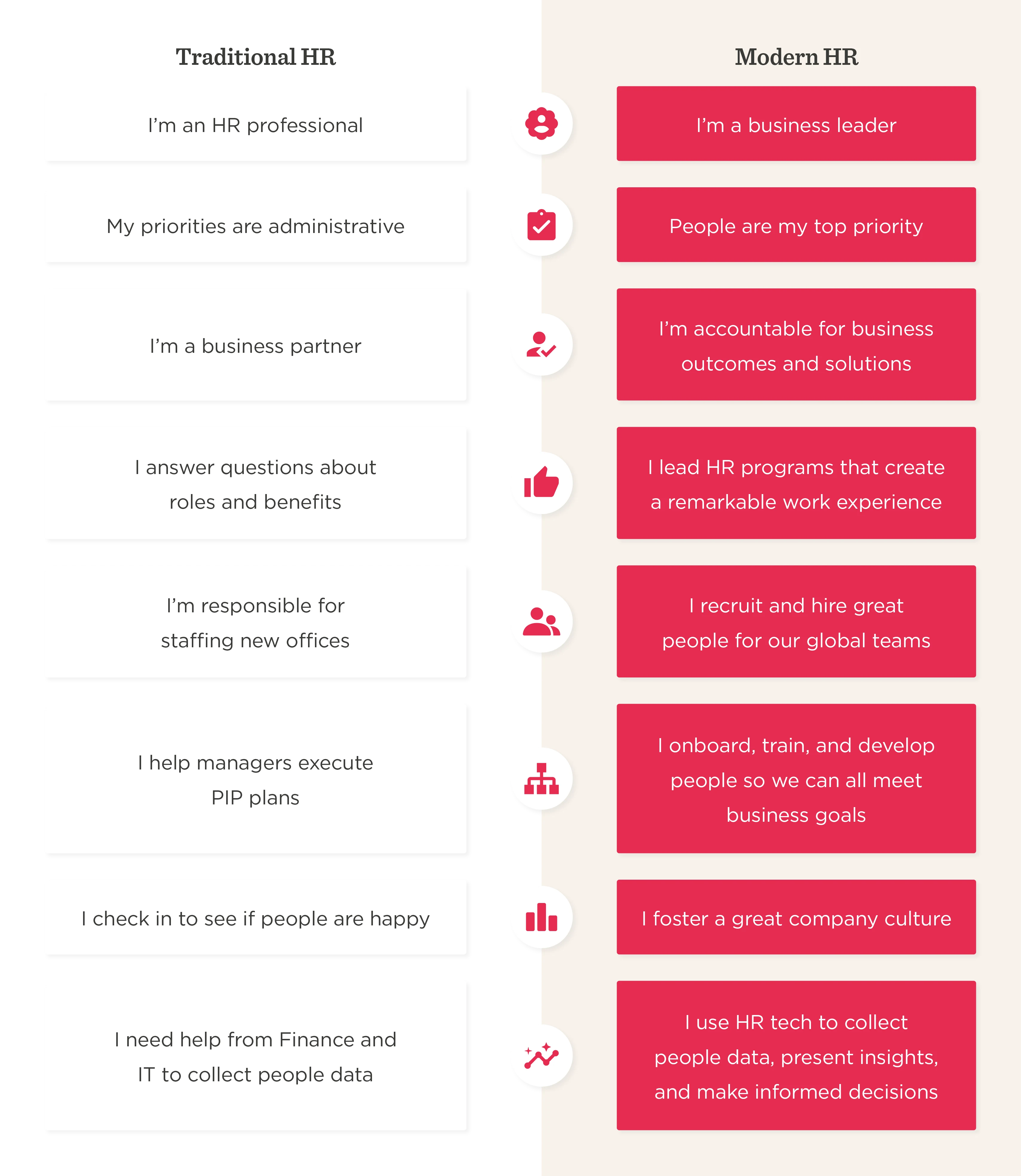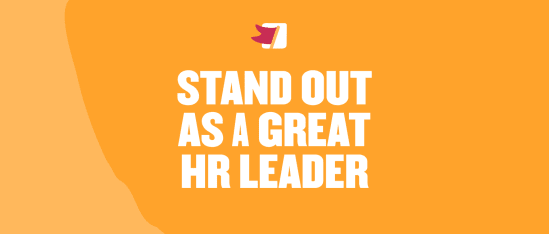Leading a human resources team is no small undertaking. In addition to the need for hard skills like using HR technology and vast knowledge of complex topics like benefits and compliance, HR leaders must also demonstrate an entire arsenal of soft skills, including empathy, communication, organization, and leadership.
This is why today’s human resources leaders are more than payroll technicians and recruiters. They’re strategic partners in helping managers and executives lead a business to success.
It takes a lot to demonstrate successful leadership in HRD in the modern workplace. Human resources leadership now emphasizes a balance between empathy with strategy. Adopting new approaches, like human-centric leadership models, can help leaders navigate change while keeping people at the center of their strategies.
Why is strategic human resources leadership important?
Strategic human resources (HR) leadership helps ensure an organization’s people strategy is closely aligned with overall business objectives. HR leaders who take a forward-thinking approach to addressing workforce processes such as talent acquisition, employee retention, and skills development drive greater organizational agility and empower their people to support evolving organizational needs.
Strategic HR leadership also involves creating a positive workplace culture by implementing programs that support team member engagement and wellbeing, including wellness programs, employee assistance programs (EAP), diversity and inclusion initiatives, and more. Through these targeted efforts, HR leaders help the organization adapt to changing business needs and drive sustainable growth and long-term success.
The evolution of modern HR leadership
HR leadership has come a long way from its roots in administrative functions. Historically, HR professionals were primarily responsible for staffing logistics, answering questions about job roles and benefits, assisting managers with performance improvement plans (PIPs), and gauging team member satisfaction.
Over time, the scope of HR began to expand. Today, HR leaders are expected to make decisions that shape their company’s culture, drive innovation, and boost employee engagement. Digital tools increasingly streamline many transactional tasks, freeing up HR professionals to focus on bigger-picture challenges. At the same time, evolving workforce expectations—from flexible work environments to demands for meaningful career development—pushed HR into a more proactive role.
HR leadership now focuses on building connected, people-centric organizations. HR leaders who encourage trust and collaboration can help create environments where people feel valued and supported, which drives retention, productivity, and overall organizational health.

Key HR leadership skills
Now that you understand the big picture, let’s take things down to a more micro level. On the individual scale, what makes a good HR person? Here are the most important and meaningful skills.
Balance
Strong HR leaders understand the art of balancing. They combine business goals with empathy, ensuring processes and guidelines don’t overshadow the human experience. It’s about aligning organizational requirements with people’s needs—whether it’s creating policies that improve compliance or encouraging engagement through meaningful interactions. Striking this balance helps HR leaders guide teams with both strategy and care.
Agility
An agile HR leader is forward-thinking and open to new things. They are flexible and can adjust policies and strategies as needed, staying current on the latest technological trends to optimize processes, save time, and remain ahead of the curve.
Emotional intelligence and empathy
As technological and data-driven as we can be, HR is ultimately about people. This makes emotional intelligence and empathy invaluable skills that play a central role in offering teams the necessary support and guidance. Emotional intelligence enables leaders to recognize emotional cues in themselves and others, while empathy allows them to deeply understand and respond to those emotions. Together, these skills make it easier to build trust, navigate difficult conversations, and build positive working relationships.
Cultural fluency
Cultural fluency is the ability to navigate and respect diverse perspectives and experiences in the workforce. HR leaders with this skill use their understanding of cultural nuances to create inclusive policies and practices that resonate with their teams. They also champion diversity, equity, and inclusion initiatives that celebrate differences while encouraging unity and collaboration. This fluency helps build a workplace where everyone feels like they belong.
Problem-solving
No day in the life of an HR leader is the same as the day before, but most have one thing in common: They are full of little fires you have to put out. Whether it’s a conflict between people or a tricky organizational strategy problem, HR leaders need to be able to think quickly and strategically to come up with effective solutions.
Innovation
Innovation in HR isn’t just about adopting technology—it’s about rethinking how things are done. Effective HR leaders approach challenges with creativity, whether they’re designing programs to increase employee engagement, improving onboarding processes, or finding new ways to build connections in hybrid workplaces. They’re always looking for opportunities to improve processes and make meaningful changes that enrich the employee experience.
Communication
Human resources is one of the few departments that interfaces with nearly everybody throughout the organization, meaning that HR leaders’ ability to effectively communicate is key. Employ active listening, open dialogue, and transparency to build trust while avoiding misunderstandings.
Ethics and integrity
As an HR leader, you’re trusted with a lot of confidential data and sensitive information. Apply high ethical standards and follow the most up-to-date security practices in order to keep everything private.
Accountability
Accountability is about owning your decisions and actions and encouraging others to do the same. HR leaders model accountability among their people by setting clear expectations, tracking progress, and providing constructive feedback. When accountability is an essential part of the workplace culture, it strengthens trust, improves performance, and ensures everyone is aligned with the organization’s objectives.
People-first approach
A people-first strategy prioritizes the experiences, growth, and wellbeing of your teams. HR leaders who embrace this mindset focus on building policies and initiatives that center on people’s needs—whether it’s creating flexible work options, supporting professional development, or building a culture of inclusivity. Putting people at the heart of every decision helps create a workplace where everyone feels valued and empowered to do their best work.
<<Use this free career path template to support your people’s career goals.>>
Strategic decision-making
Strategic HR decision-making requires a mix of data-driven insights and intuitive understanding. Human resources leaders evaluate multiple factors—workforce data, team member feedback, and business objectives—to make informed choices that align with organizational goals. Whether it’s deciding on recruitment strategies or designing talent programs, HR professionals ensure their decisions support long-term success while addressing immediate needs.

Strategies for HR leadership: How to be an effective HR leader
You don’t have to be a Chief Human Resources Officer to be a leader in HR. Instead, what differentiates an HR leader from any other HR person is mindset and approach. To embody leadership in HR, you should focus on honing these four abilities:
1. Master the basics
Organizations have always depended on HR leaders’ expertise and knowledge of labor laws, benefits, compensation, medical and family leave, and other policies. Today’s most successful HR leaders also have a deep understanding of organizational psychology, team member engagement, DE&I best practices, and more.
How to do it:
- Stay up to date on the latest trends, research, and developments in HR by reading global publications and websites like Harvard Business Review and Bersin by Deloitte. It’s also a good idea to read more locally relevant publications that will help you keep up with local labor laws and community changes.
- Attend industry events to connect with colleagues in different organizations. You’ll learn about tactics and strategies, get help solving knotty problems, receive recommendations for vendors and products, and focus on new and emerging areas of thought.
- Continuous learning is a hallmark of great HR leaders, so look out for degrees, short courses, diplomas, lectures, and online learning opportunities to help you upskill your (and your team’s) knowledge.
2. Brush up on soft skills
Soft skills are the foundation of effective HR leadership. They enable you to build trust and strong relationships as well as navigate challenges with empathy and understanding. These skills emphasize creating meaningful connections with your people rather than relying solely on technical skills.
How to do it:
- Focus on active listening by giving your full attention to conversations and reflecting back what you hear.
- Practice adaptability by staying calm and open-minded when faced with changes or unexpected challenges.
- Develop your ability to provide constructive feedback. Be clear, specific, and supportive, so the feedback feels like an opportunity for growth rather than criticism.
- Strengthen your communication skills by expressing your ideas clearly and concisely, both verbally and in writing, to avoid misunderstandings and enhance collaboration.
- Increase your emotional intelligence by recognizing and managing your own emotions, as well as empathizing with others, to build stronger relationships.
- Demonstrate teamwork by collaborating effectively with others, respecting diverse perspectives, and contributing to shared goals.
- Improve your problem-solving skills by approaching challenges with a positive attitude, analyzing situations thoughtfully, and seeking creative solutions.
- Show initiative by taking proactive steps to address issues, suggest improvements, and go beyond what is expected.
3. Learn how to mediate and resolve conflicts
Conflict management is a skill every HR leader needs. It’s about finding solutions that work for everyone involved while maintaining a positive and professional environment. When handled effectively, conflicts can lead to stronger relationships and better collaboration.
How to do it:
- Approach conflicts as opportunities to uncover underlying issues. Start by listening to all perspectives without judgment.
- Avoid conflict debt and resentment by addressing conflicts early and openly.
- Use neutral language during discussions to avoid escalating emotions and keep the focus on finding solutions.
- Promote psychological safety by offering counseling services, holding training sessions, and encouraging honest conversations.
- Follow up after resolving a conflict to ensure the agreement is working and all parties feel satisfied with the outcome.
4. Embrace data and technology
Reliance on SaaS technologies has skyrocketed as more and more organizations adopt remote and hybrid work structures. This increased dependence on tech has led to greater collaboration between HR and IT. Organizations must integrate people processes that collect and analyze data to drive strategic business decisions and improve overall performance.
How to do it:
- Reduce time-to-hire by automating hiring and onboarding.
- Measure productivity at the individual, team, and organizational levels by collecting data on everything from speed, effectiveness, cost, and profit.
- Be proactive about predicting and preventing team member churn at an individual level. Set up programs to either re-engage or replace people to ensure smooth transitions and avoid a lull in productivity while waiting for a new person to onboard.
- Select the right tools and resources you need to transform the way your organization collects and analyzes data. Be sure to do your research before selecting these tools.
- Create opportunities for your people to learn how to use any tools you introduce, design training sessions, or bring in experts.
5. Invest in your professional development
A commitment to ongoing growth supports effective HR leadership. Understanding your leadership style and seeking opportunities for learning and training can help you refine your skills and build confidence.
How to do it:
- Take self-assessments to identify your leadership style and discover areas where you can grow
- Pursue HR training programs and certifications in different specialties, such as talent management, DE&I, or organizational development
- Attend workshops, webinars, or conferences to stay informed about emerging trends and best practices in HR leadership
6. Be innovative and strategic
Great HR leaders must be innovative and have a sense of design thinking. These skills help you quickly adapt to new circumstances and shape organizational culture. Design thinking applies tools from the world of design to human behavior. The idea is to avoid risky decisions based on instinct and past indicators that may have no bearing on the future.
How to do it:
- Understand other industries so you can approach your people as customers and apply the best sales, marketing, and design practices to engage and retain them.
- Collaborate with other departments to solve the issues your organization faces in the ideation phase.
- Define and bring to life a culture that keeps people engaged, healthy, connected, satisfied, and performing their best. Because culture doesn’t just happen.
- Step away from the old model of HR-as-administrator. It’s time to embrace a vision of HR that sees the HRD as the source of knowledge regarding the most critical resource available in the business: its people.
7. Reach out to experienced HR leaders
Building connections with experienced HR leaders is a powerful way to learn and grow. These relationships can provide you with fresh perspectives, practical advice, and a supportive network as you navigate challenges.
How to do it:
- Join HR-focused professional associations or online communities to connect with experienced leaders in your field
- Attend networking events and conferences to meet peers and exchange ideas in person
- Seek out mentorship experiences with professionals who can offer guidance and share their experiences to help you advance your career
- Maintain regular communication with your network and look for opportunities to collaborate or learn from one another
8. Remember your “why”
HR leadership is about more than just policies and procedures—it’s about making a meaningful impact on people’s lives. Remain motivated and inspire others by keeping your “why” front of mind.
How to do it:
- Reflect on the reasons you chose a career in HR and how your work contributes to the organization and its people
- Set personal and professional goals that align with your values and vision for HR leadership
- Celebrate your achievements and the positive changes you’ve helped create, no matter how small
What it takes to be a great HR leader today
HR has evolved significantly over the last few years, and HR leaders may struggle to embrace their new roles and the expectations that come with them. Today’s HR leaders must be fully engaged in the present and invest their efforts in creating great cultures, engaging people, and optimizing performance. This is how to ensure long-lasting success.
<< Use this strategic HR plan to build a clear roadmap for supporting business strategy. >>
Human resources leadership FAQs
How is HR leadership different from traditional management?
While traditional management focuses on overseeing teams and ensuring day-to-day operations run smoothly, HR leadership takes a broader view. HR leaders shape workplace culture, guide organizational strategy, and advocate for the needs of people across the company.
HR leadership also requires a unique set of skills. It’s not just about enforcing policies—it’s about creating an environment where people feel supported, valued, and motivated to do their best work.
Why is empathy so important in HR leadership?
Empathy is at the heart of great HR leadership because it helps leaders truly understand their people. When HR leaders can see things from someone else’s perspective, they’re better equipped to create solutions that address real needs. Whether it’s listening to concerns, offering support, or making a tough decision with compassion, empathy builds trust and strengthens relationships.
It also plays a key role in creating a positive culture. When people feel valued and heard, they’re more likely to be engaged and productive. Empathy helps HR leaders navigate challenges with care and ensures that decisions reflect the organization’s goals and people’s wellbeing.
Should HR leaders focus on external factors like customers?
Yes, and here’s why: Customers are a core part of any business’s success, and people strategies that reflect this connection can deliver measurable impact. HR leaders play a key role in aligning talent decisions with customer needs, but the approach depends on the role.
For customer-facing positions, prioritizing professionals with strong communication, empathy, and problem-solving skills helps elevate the client experience. For internal or technical roles, designing onboarding and development programs that emphasize collaboration and customer impact can still contribute to satisfaction across the value chain. When HR leaders embed a customer lens into hiring and development, they help build teams that deliver both internally and externally.
Recommended For Further Reading
What are HR leaders’ biggest priorities in today’s business world?
HR leaders have a wide range of priorities, but a few stand out:
- Improving people’s experience: From onboarding to career development, HR leaders focus on creating positive experiences that keep people engaged.
- Driving DEI&B initiatives: Diversity, equity, inclusion, and belonging are integral to building a strong workplace. HR leaders prioritize policies and programs that promote fairness and belonging.
- Leveraging technology: HR tech helps human resources leaders make strategic decisions, streamline processes, and measure their impact. HRIS software and other HR platforms reduce manual workload so teams can prioritize strategic and people-focused tasks.
- Supporting wellbeing: HR leaders prioritize mental health and work-life balance, creating a culture where people can thrive.
- Developing leaders: Identifying and nurturing future leaders ensures the organization has a strong pipeline of talent for long-term success.
What are some HR leadership job titles?
HR leadership roles vary depending on the organization’s size and structure. Common HR titles include:
- Chief human resources officer (CHRO): Aligns HR strategy with business goals and drives long-term people initiatives
- Chief people officer (CPO): Leads all aspects of people strategy, focusing on culture, engagement, and organizational growth
- VP of human resources: Leads strategic HR initiatives and oversees all HR functions organization-wide
- HR director: Manages HR operations and ensures alignment with organizational objectives
- HR business partner: Works closely with department leaders to tailor HR strategies to specific teams or functions
- Head of talent acquisition: Focuses on recruitment strategies and building a strong talent pipeline
- Director of employee experience: Designs programs to boost engagement, satisfaction, and retention
- DE&I leader: Champions diversity, equity, and inclusion across the organization
- HR data analyst: Uses workforce data to inform decisions and improve HR strategies


